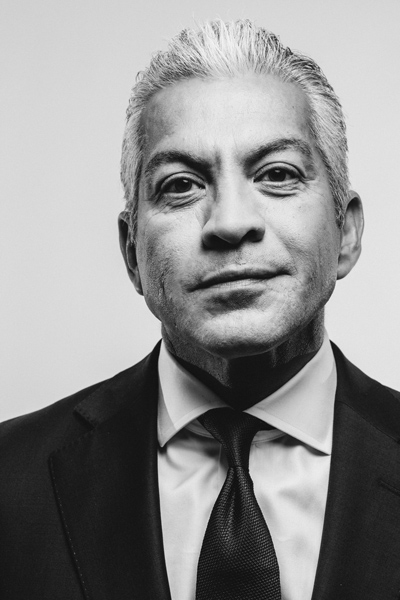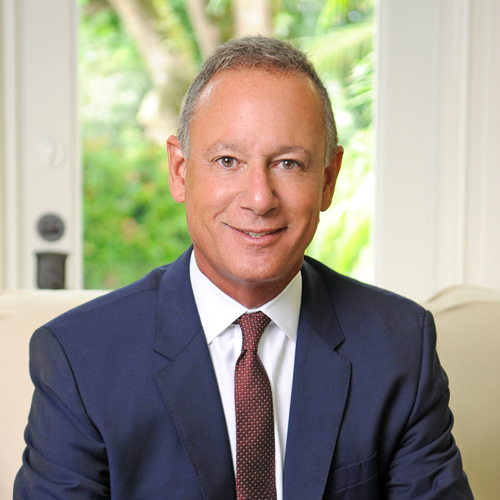
The biggest misconception about leadership is that it is something to be pursued. “You don’t wake up one morning and say, ‘I’m going to be a leader,’” says Javier Palomarez, president and CEO of the United States Hispanic Chamber of Commerce (USHCC). “It will find you because of difficult circumstances, an impasse, or an environment that calls for leadership.”
Palomarez is currently in the eye of the political storm in Washington, DC, and advocating for Hispanic economic development at one of the most divisive times in American politics. As leader of the USHCC, he unifies leaders worldwide with a clear, bipartisan mission: support the more than 4.2 million Hispanic-owned businesses that contribute $668 billion to the US economy.
It’s no easy task, and Palomarez knows firsthand that true leadership is a constant test of conviction—and it’s not always glamorous. In the aftermath of the tragic events in Charlottesville, Virginia, Palomarez went on live TV and called for President Donald Trump to fire then-White House Chief Strategist Steve Bannon, one of Trump’s top advisors in the White House and an extreme nationalist. For this, Palomarez was heavily criticized for both “antagonizing Trump” and, paradoxically, for not going far enough to distance himself from the administration.
In that spirit, Palomarez, the Top Ten Líderes guest editor, spoke with Hispanic Executive to uncover the vital tenets of ethical leadership that are all too often buried under the pressures of popularity and politics.
What leadership qualities are overrated?
The notion that leaders should be celebrated. Many leaders are quietly making a significant difference in society. Leadership, in my opinion, means a job well done should be its own reward. If you’re doing it for the acclaim or notoriety, you’re doing it for all the wrong reasons.
What about underrated characteristics?
The ability to listen. Effective leadership is about surrounding yourself with people that challenge you—people that push you to be your best self. Convene a wide array of perspectives to come up with solutions for the best path forward.
How do you demonstrate those values in the workplace?
The proof is in the pudding. You have integrity, or you don’t. You tell the truth, or you don’t. Practice these values every single day, particularly when you’re facing ethical dilemmas. Leadership isn’t easy. You may be ridiculed, but a real leader will still do the right thing.
Given the contentious political climate, how do you lead to keep others motivated?
I focus on my clients and constituents. I was hired to do a job, and I keep their needs and perspectives firmly in mind. I don’t have the luxury to throw my hands up and walk away from a challenge. American small businesses drive two-thirds of all jobs in this nation, and oftentimes we don’t have a voice in the national dialogue. My job is to demand to be heard.
We stay motivated by incremental progress. There are no silver bullets. There are no easy solutions. It’s more effective to campaign from the inside than to complain from the outside. We must stay engaged and make it about the best interest of the economy and the American people—and not be distracted by the noise, rhetoric, or challenge.
What major challenges do leaders face today?
Separating personal feelings from the needs of the moment. If I followed my personal ideology, I would be acting starkly different than the way I am acting today as the leader of this association. Second to this is speaking up when nobody else will. When I find myself being the lone voice in the argument, it’s demoralizing not to have other leaders standing up beside me. But that doesn’t absolve me of my responsibilities.
Why is separation of ideology crucial to negotiation?
If I allow my emotions to engage, then I have already cheated myself from the ability to negotiate the best deal I possibly can. Even if you’re disgusted, frankly, with some of what’s coming out of our political parties, I don’t get paid to be outraged—I get paid to produce results. And I can’t produce results if I’m letting my emotions take charge.
How has your leadership style evolved?
I try to make every day count. I stay laser-sharp focused on what I’m responsible for and can change. I’ve learned it’s not easy to forecast when and where leadership is going to be required. But you can continually make sure you’re doing your best job.
Who has impacted your trajectory as a leader?
Many dear friends, counselors, and advisors—Lloyd Blankfein from Goldman Sachs, Arizona Senator John McCain, Verizon CEO Lowell McAdam, and others. But head and shoulders above everyone is my mother. The values she imparted to me—hard work, civility, integrity, and the pride that one feels in a job well done—I learned by the time I was about ten years old, and they have stayed with me since.
How should young executives dig deeper into their leadership development?
Reputations are earned over time. Don’t start out to be a leader for leadership’s sake. Start out to make a difference or solve a problem. If you’re good at that, leadership will find you. Don’t start anything for the adulation.
What mistake have you witnessed leaders making repeatedly?
Many leaders worry about how something will be perceived rather than doing what is right. If you use your moral compass, it will allow you to navigate trickier waters. Leadership is not a popularity contest. It’s about doing what’s right when, most of the time, no one is watching. Even if no one will ever know, do it anyway.
How do you continue to grow as a leader?
I surround myself with young people; they keep me on my toes. I also try to never lose sight of those I represent. If you keep your clients and constituents squarely in mind, are open to dialogue, and don’t assume that being the leader means you know the best answer, it will force you to grow every day.
What resources would you point to for new leaders?
Find a mentor to offer you counsel as you evolve and build your career. Leadership isn’t learned in a book. Leadership is found during a challenge or during a moment of uncertainty, and that’s when you have the opportunity to step up.
What common thread unites the top líderes in Hispanic Executive’s list this year?
They’re moving the needle in their respective industries in ways that may not be garnering headlines. They’re holding the door open to reach back, give back, and lift up. They’re humble. They’re conscientious. They work without fanfare, but with genuine concern for their community. Passion drives them. Some have been doing what they’re doing now for decades. They have the will to stick to it and overcome obstacles to reach their respective goals.

